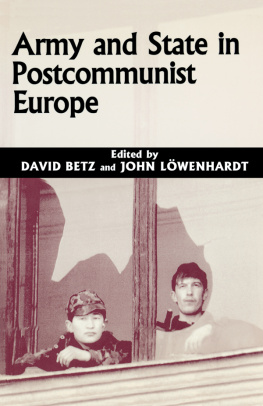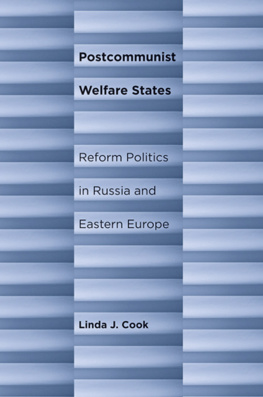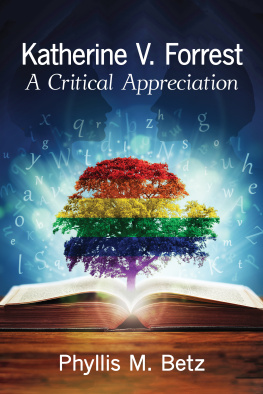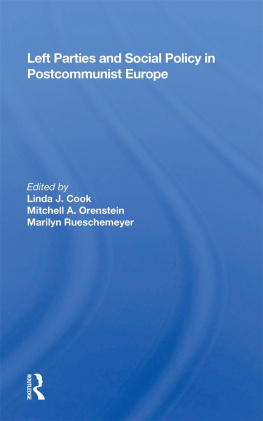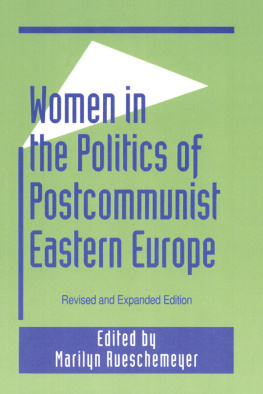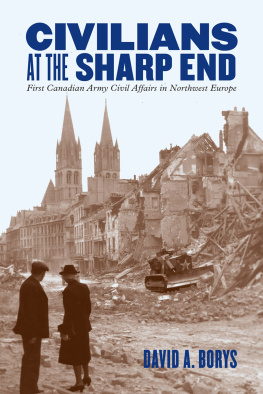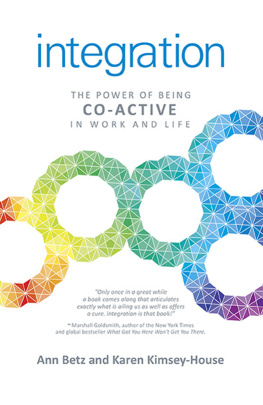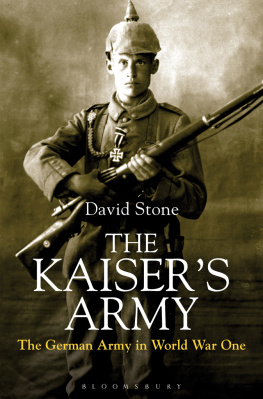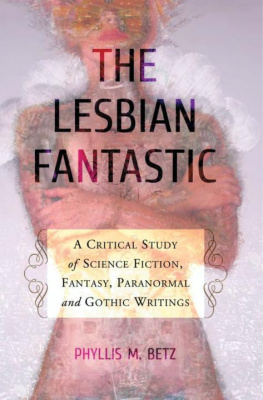Army and State in Postcommunist Europe
Of Related Interest
PARTY POLITICS IN POST-COMMUNIST RUSSIA
edited by John Lwenhardt
BEYOND STALINISM: COMMUNIST POLITICAL EVOLUTION
edited by Ronald J. Hill
THE SOVIET TRANSITION: FROM GORBACHEV TO YELTSIN
edited by Stephen White, Rita di Leo and Ottorino Cappelli
SOCIAL DEMOCRACY IN A POST-COMMUNIST EUROPE
edited by Michael Waller, Bruno Coppieters and Kris Deschouwer
POST-COMMUNISM AND THE MEDIA IN EASTERN EUROPE
edited by Patrick H. ONeil
PARTIES, TRADE UNIONS AND SOCIETY IN EAST-CENTRAL EUROPE
edited by Michael Waller and Martin Myant
GENDER AND IDENTITY IN CENTRAL AND EASTERN EUROPE
edited by Chris Corrin
FORCED MIGRATION IN CENTRAL AND EASTERN EUROPE, 1939-1950
edited by Alfred J. Rieber
First Published in 2001 by Frank Cass Publishers
Published 2014 by Routledge
2 Park Square, Milton Park, Abingdon, Oxon OX14 4RN
711 Third Avenue, New York, NY 10017 USA
Routledge is an imprint of the Taylor & Francis Group, an informabusiness
Copyright 2001 Taylor & Francis
British Library Cataloguing in Publication Data
Army and state in postcommunist Europe
1.Civil-military relations - Europe, Eastern 2.Europe, Eastern - Armed Forces 3.Europe, Eastern - Politics and government - 1989
I.Betz, David II. Lowenhardt, John III.Journal of communist studies and transition politics
947 .0009045
ISBN 978-0-7146-8159-7
Library of Congress Cataloging-in-Publication Data
Army and State in postcommunist Europe / edited by David Betz and John Lowenhardt.
p. cm.
This group of studies first appeared in a special issue of The
journal of communist studies and transition politics 17/1 (March 2001)-T.p. verso
Includes bibliographical references and index.
1. Civil-military relations-Europe, Eastern. I. Betz, David,
1969- . II. Lowenhardt, John. III. Journal of communist studies and transition politics. 2001, vol. 17, no. 1 (Special issue)
322'.5'0947-dc21
2001028626
This group of studies first appeared in a Special Issue on Army and State in Postcommunist Europe of The Journal of Communist Studies and Transition Politics (ISSN 1352-3279) 17/1 (March 2001) published by Frank Cass.
All rights reserved. No part of this publication may be reproduced, stored in or introduced into a retrieval system, or transmitted, in any form, or by any means, electronic, mechanical, photocopying, recording, or otherwise, without the prior written permission of the publisher of this book.
ISBN 978-1-315-03997-8 (eISBN)
Contents
John Lwenhardt, David Betz and Hew Strachan
Chris Donnelly
Yuri A. Ivanov
Pavel K. Baev
Sven Gunnar Simonsen
James Sherr
Zoltn Szenes
Tomas Zipfel
Dimitar Dimitrov
Anton Bebler
David Betz, John Lwenhardt and Hew Strachan
JOHN LWENHARDT, DAVID BETZ and HEW STRACHAN
War is a real political instrument, a continuation of political commerce, a carrying out of the same by other means. These famous words, written in the early nineteenth-century by the Prussian soldier and military theorist Carl von Clausewitz, have become one of the cornerstones of thinking and practice concerning the relationship between military force and political power. One of the things that Clausewitz argued was that in war civil authorities should always be in control and that it would be self-defeating for the military to take over essentially political decisions. Ultimately, the role of the armed forces is to defend the interests of the state if all other means of doing so (such as diplomacy) have failed. As in wartime, so in peace: civil authorities should be in command, for only they are geared to the demands of political decision-making. The task of generals is to provide them with advice and ultimately to implement their instructions and to fight. The problem, however, is that generals have ideas, interests and emotions as politicians have, and that only they the generals have arms. They may be tempted to shove politicians aside and to take over the running of the state, as they have done in the past in many countries. Alternatively, politicians may be stubborn or stupid (or, as happens, both) and refuse to listen to informed military advice with dire consequences.
This, in a nutshell, is what civil-military relations are about. What we are looking at here is a subset of that problem, namely the difficulties encountered in countries making a transition from communist rale to some form of democratic rule, requiring democratic civil-military relations. Whereas Clausewitz was mainly concerned with the problem of how in time of war generals and politicians could and should keep out of each others hair, here we look at the transformation of civil-military relations in times of revolutionary but peaceful change. With the exception of Yugoslavia, the systems that collapsed a decade ago have moved away from communist dictatorship in generally peaceful circumstances. The generals have not intervened in politics. Yet this in itself has not solved the puzzle of transforming civil-military relations in a communist-dominated system into truly democratic relations, where the armed forces, elected representatives of the people and civil servants work together to receive the highest value for money in planning for the event of having to fight it out with another state.
In the 1980s, during the years before the final collapse, it was not at all self-evident that communist rulers would surrender power without putting up a fight. Their power over societies and armed forces was indeed perceived as being so overwhelming that it seemed inconceivable that they would not use military force to quell civil unrest and to keep themselves in power. Over and over again in 1953 in Berlin, in 1956 in Hungary, in 1968 in Czechoslovakia, and in 1981 almost in Poland they had aimed Kalashnikovs and tanks at social or political forces that endangered their rule. During the final years before his death in 1982, Soviet Communist Party General Secretary Leonid Brezhnev (who had ruled since 1964) created a war scare throughout the USSR and the other countries of the Soviet Bloc to shore up his conservative policy. Even during the transition period between his death and the accession of Mikhail Gorbachev in March 1985, it was inconceivable that the communists would forgo the use of their loyal armed forces if things were threatening to get out of hand. But in 1989-90 this was exactly what happened: the communists forfeited power without much bloodshed and without the military leaving their barracks. Furthermore, the military leaderships proved as loyal to their new political masters as they had to their old.
During the communist period the loyalty of the armed forces was secured through a complex set of covert and overt controls governing their composition and operation. The overall system of control was further strengthened by the high status accorded to officers, almost without exception members of the communist party, who were among the most privileged members of their societies. In relation to most of the population they enjoyed good salaries and benefits, and the last thing they worried about was their social position after retirement. It was secured with generous pensions and seaside retreats. In general, the armed forces were also among the most trusted institutions in their societies, outdone in countries such as Poland and the USSR only by the Catholic and Orthodox Churches.
In the streets of Moscow, Prague and Bucharest military uniform was omnipresent. The armed forces and the military-industrial sector were large and complex organizations, requiring very high shares of the state budget for their maintenance. In economic planning they had the highest priority and were favoured over soft sectors such as the production of consumer goods. Except for the USSR, they were subject to a double control system. In the USSR communist party units permeated the armed forces organizations from top to bottom, as they did in the other countries of the bloc. But in Central Europe this control system was itself subordinated to the Communist Party of the Soviet Union, and the higher officer corps in these countries generally received their training in the military academies of the USSR. This control system provided an extra check alongside the hierarchy of communist parties. For the rulers of the Moscow Kremlin it provided an extra assurance that the peoples democracies of Central Europe would not make the mistake of opting out from the joint march towards communism.

